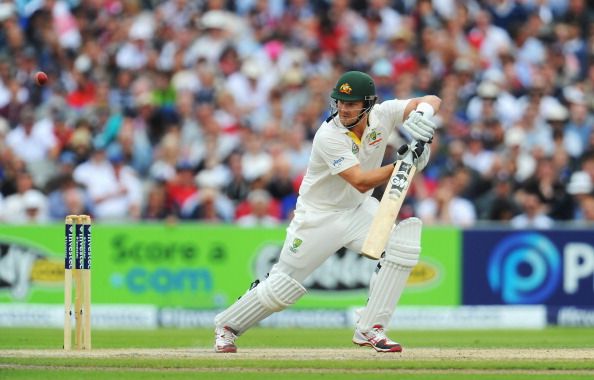
The Ashes 2013: "DRS complicating the game" - Shane Watson

Shane Watson has had a hard time during the current Ashes series. (Getty Images)
Australian all-rounder Shane Watson believes the DRS has pushed away the concept of benefit of doubt, which was usually given to batsmen in case of tight decisions, and has made way for exceedingly precise decisions even in the case of close calls.
The Australian side have made the least effective use of the DRS all throughout the Ashes series, with Watson especially being one of the biggest offenders of the pricey technology.
The 32-year-old right-handed batsman has had a poor Ashes series so far with three of his four dismissals in the first two Tests coming from LBW. He failed to get two of his LBW dismissals overturned, including the one where he was caught clean in line with the stumps to pacer Tim Bresnan‘s well-pitched delivery.
However, Watson was sorely disappointed when his review in the first Ashes Test at Trent Bridge was turned down, with the ball appearing to kiss the wicket on the way past.
Nevertheless, Watson appreciated the DRS for its elevated accuracy but was quite dejected to have been made to walk back to the pavilion without being given the benefit of the doubt, particularly when he was on 46 at the time.
“There’s supposed to be the benefit of the doubt going to the batsman. Bowlers get a chance to come back and bowl another ball, but for a batsman, if they’re out, they’re out,” he said.
“DRS, for me personally, makes things pretty complicated when the rules of the game were set up to be as uncomplicated as possible. Batting-wise, if there’s benefit of the doubt, the benefit goes to the batsman. As a bowler you accept that.
“So it’s going to be interesting to see how DRS evolves. At the moment, there’s no doubt that for the amount of airtime the DRS has got over these last three Test matches, it’s certainly not working to how it was supposed to be set up to work,” he added.
There have been quite a few instances in the current Ashes series so far when players had to gamble whether to review the original decision. A classic example would be when an in-swinger from Watson hit Kevin Pietersen‘s pad during his first innings of the Old Trafford Test.
Hawk Eye showed that had the visitors appealed for a review, Pietersen would have been dismissed before putting up 113 next to his name but Watson decided to let the original decision of not out stand as Pietersen appeared to have come a long way down the pitch.
“I’m not the person to ask about DRS really,” Watson said. “One thing I have learnt over these three Test matches is that I don’t have a career in umpiring after I finish.
I’ll certainly leave it to the experts to be able to do it. Look, in the end he was a long way down the wicket and we all thought there’s a bit of doubt there, as the umpire did as well,” he added.